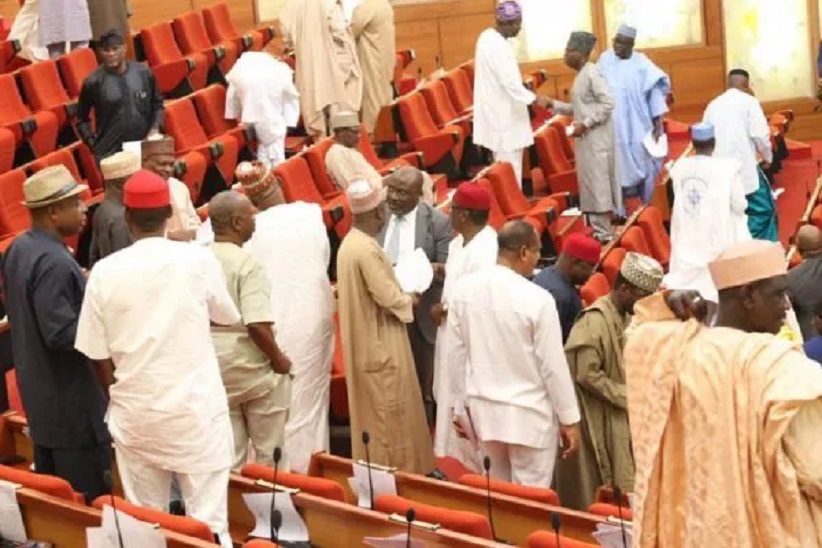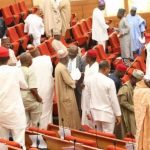General
SERAP Urges NASS to Reject Buhari’s Fresh Loan Request

By Adedapo Adesanya
The Socio-Economic Rights and Accountability Project (SERAP) has urged the National Assembly to reject the fresh loan request of President Muhammadu Buhari.
Last week, at the resumption of plenary on the Senate after a break, Mr Ahmad Lawan, the Senate President, read a letter from Mr Buhari requesting to borrow $4 billion and €710 million.
But in a letter, SERAP said both chambers, the Senate and House of Representatives, should not grant this request until the publication of details of spending of all loans obtained since the Buhari-led administration took office on May 29, 2015.
In the open letter signed by SERAP deputy director, Mr Kolawole Oluwadare, the group expressed “concerns about the growing debt crisis, the lack of transparency and accountability in the spending of loans that have been obtained, and the perceived unwillingness or inability of the National Assembly to vigorously exercise its constitutional duties to check the apparently indiscriminate borrowing by the government.”
SERAP said: “The National Assembly should not allow the government to accumulate unsustainable levels of debt, and use the country’s scarce resources for staggering and crippling debt service payments rather than for improved access of poor and vulnerable Nigerians to basic public services and human rights.”
According to SERAP, “Accumulation of excessive debts and unsustainable debt-servicing are inconsistent with the government’s international obligations to use the country’s maximum available resources to progressively achieve the realisation of economic and social rights, and access of Nigerians to basic public services.”
The letter read in part: “The country’s public debt has mushroomed with no end in sight. The growing national debt is clearly not sustainable. There has been no serious attempt by the government to cut the cost of governance. The leadership of the National Assembly ought to stand up for Nigerians by asserting the body’s constitutional powers to ensure limits on national debt and deficits.
“SERAP urges you to urgently propose a resolution and push for a constitutional amendment on debt limit, with the intent of reducing national debt and deficits. This recommendation is entirely consistent with the constitutional oversight functions and spending powers of the National Assembly, and the country’s international anti-corruption and human rights obligations.
“Indiscriminate borrowing has an effect on the full enjoyment of Nigerians’ economic and social rights. Spending a large portion of the country’s yearly budget to service debts has limited the ability of the government to ensure access of poor and vulnerable Nigerians to minimal health care, education, clean water, and other human needs.
“Should the National Assembly and its leadership fail to rein in government borrowing, and to ensure transparency and accountability in the spending of public loans, SERAP would consider appropriate legal action to compel the National Assembly to discharge its constitutional duties.
“The National Assembly under your leadership has a constitutional responsibility to urgently address the country’s debt crisis, which is exacerbated by overspending on lavish allowances for high-ranking public officials, lack of transparency and accountability, as well as the absence of political will to recover trillions of naira reported to be missing or mismanaged by the Office of the Auditor-General of the Federation.
“The National Assembly should stop the government from borrowing behind the people’s backs. Lack of information about details of specific projects on which loans are spent, and on loan conditions creates incentives for corruption, and limits citizens’ ability to scrutinise the legality and consistency of loans with the Nigerian Constitution of 1999 (as amended), as well as to hold authorities to account.
“SERAP notes that if approved, the country’s debts will exceed N35 trillion. The government is also reportedly pushing the maturity of currently-secured loans to between 10 and 30 years. N11.679 trillion is reportedly committed into debt servicing, while only N8.31 trillion was expended on capital/development expenditure between 2015 and 2020.
“Ensuring transparency and accountability in the spending of loans by the government and cutting the cost of governance would address the onerous debt servicing, and improve the ability of the government to meet the country’s international obligations to use maximum available resources to ensure the enjoyment of basic economic and social rights, such as quality healthcare and education.”
General
Amupitan Says 2027 Elections Timetable Ready Despite Electoral Act Delay

By Adedapo Adesanya
The Independent National Electoral Commission (INEC) has completed its timetable and schedule of activities for the 2027 general election, despite pending amendments to the Electoral Act by the National Assembly.
INEC Chairman, Mr Joash Amupitan, disclosed this on Wednesday in Abuja during a consultative meeting with civil society organisations.
Mr Amupitan said the commission had already submitted its recommendations and proposed changes to lawmakers, noting that aspects of the election calendar might still be adjusted depending on when the amended Electoral Act is passed.
He, however, stressed that the electoral umpire must continue preparations using the existing legal framework pending the conclusion of the legislative process and presidential assent to the revised law.
According to him, the commission cannot delay critical preparatory activities given the scale and complexity involved in conducting nationwide elections.
The development highlights INEC’s commitment to early planning for the 2027 polls, even as stakeholders await legislative clarity that could shape parts of the electoral process.
Yesterday, the Senate again failed to conclude deliberations on the proposed amendment to the Electoral Act after several hours in a closed-door executive session. The closed session lasted about five hours.
Lawmakers dissolved into the executive session shortly after plenary commenced, to consider the report of an ad hoc committee set up to harmonise senators’ inputs on the Electoral Act Amendment Bill.
When plenary resumed, the Senate President, Mr Godswill Akpabio, did not disclose details of the discussions on the bill.
Despite repeated executive sessions, the upper chamber has yet to pass the bill, marking the third unsuccessful attempt in two weeks.
The Senate, however, said it will not rush the bill, citing the volume of post-election litigation after the 2023 polls and the need for careful legislative scrutiny.
Last week, the red chamber of the federal parliament constituted a seven-member ad hoc committee after an earlier three-hour executive session to further scrutinise the proposed amendments.
General
REA Expects Further $1.1bn Investment for New Mini Power Grids

By Adedapo Adesanya
The Managing Director of the Rural Electrification Agency, (REA), Mr Abba Aliyu, is poised to attract an estimated $1.1 billion in additional private-sector investment to further achieve the agency’s targets.
He said that the organisation has received a $750 million funding in 2024 through the World Bank funded Distributed Access through Renewable Energy Scale-up (DARES) project.
He added that this capital is specifically intended to act as a springboard to attract an estimated $1.1 billion in additional private-sector investment, with the ultimate goal of providing electricity access to roughly 17.5 million Nigerians through 1,350 new mini grids.
Mr Aliyu also said that the Nigeria Electrification Project (NEP) has already led to the electrification of 1.1 million households across more than 200 mini grids and the delivery of hybrid power solutions to 15 federal institutions.
According to a statement, this followed Mr Aliyu’s high-level inspection of Vsolaris facilities in Lagos, adding that the visit also served as a platform for the REA to highlight its decentralized electrification strategy, which relies on partnering with firms capable of managing local assembly and highefficiency project execution.
The federal government, through the REA, underscored the critical role the partnership with the private sector plays in achieving Nigeria’s ambitious off-grid energy targets and ending energy poverty.
Mr Aliyu emphasized that while public funds serve as a catalyst, the long-term sustainability of Nigeria’s power sector rests on credible private developers who are willing to invest their own resources.
He noted that public funds are intentionally deployed as catalytic grants to ensure that the private sector maintains skin in the game which he believes is the only way to guarantee true accountability and the survival of these projects over time.
General
FG Eyes Higher Allocation as Senate Moves to Amend Revenue Sharing Formula

By Adedapo Adesanya
The Senate has proposed a review of the current revenue-sharing formula among the three tiers of government, seeking to allocate more funds to the federal government.
The proposal is contained in a constitutional amendment bill titled Constitution of the Federal Republic of Nigeria, 1999 (Alteration) Bill, 2026, sponsored by Mr Karimi Sunday representing Kogi-West, which passed first reading during plenary on Tuesday.
Coming amid ongoing calls for a new revenue formula to favour states and local governments, the bill argues for an increased federal share from the existing formula.
Under the current revenue sharing formula designed during the President Olusegun Obasanjo administration, the federal government takes about 52.68 percent of the total revenue generation by the nation in a month, the 36 state governments including the Federal Capital Territory, Abuja get 26.72 per cent and the 774 local governments share 20.60 per cent. The oil producing states of the Niger Delta region receive 13 per cent revenue as derivation to compensate for ecological damage of oil production in the region.
Defending the bill, the senator in a media conference on Tuesday stated that the federal government is overburdened by responsibilities such as the rehabilitation of dilapidated Trunk A roads and rising security costs, adding that available funds are no longer sufficient.
Ahead of its second reading, the lawmaker alleged that some states have little to show for funds received from the federation account.
The battle to change the sharing formula has been ongoing for more than 12 years. In 2013, the Revenue Mobilisation Allocation and Fiscal Commission (RMAFC) resolved to undertake a review to achieve a balanced development of the country.
To achieve that objective, the commission embarked on a nationwide consultation to the 36 states and also met with notable persons, including traditional rulers on the issue.
In December 2014, the commission came out with a proposed new revenue formula, which was submitted to the government. However, the report was not implemented.
Proponents have argued that the review of the revenue allocation among the federal, states and local governments of the federation has become necessary due to the current economic realities the country is facing.
-

 Feature/OPED6 years ago
Feature/OPED6 years agoDavos was Different this year
-
Travel/Tourism9 years ago
Lagos Seals Western Lodge Hotel In Ikorodu
-

 Showbiz3 years ago
Showbiz3 years agoEstranged Lover Releases Videos of Empress Njamah Bathing
-

 Banking8 years ago
Banking8 years agoSort Codes of GTBank Branches in Nigeria
-

 Economy3 years ago
Economy3 years agoSubsidy Removal: CNG at N130 Per Litre Cheaper Than Petrol—IPMAN
-

 Banking3 years ago
Banking3 years agoSort Codes of UBA Branches in Nigeria
-

 Banking3 years ago
Banking3 years agoFirst Bank Announces Planned Downtime
-

 Sports3 years ago
Sports3 years agoHighest Paid Nigerian Footballer – How Much Do Nigerian Footballers Earn












